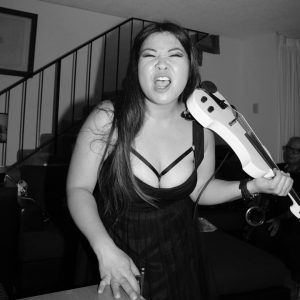 Today we’d like to introduce you to Koi Anunta.
Today we’d like to introduce you to Koi Anunta.
Koi, can you briefly walk us through your story – how you started and how you got to where you are today.
Sure! Well, I have a pretty atypical background as musicians go, since I’d never actually intended to become a full-time musician. The short version is that I am an Ivy League-educated medical doctor who gave up everything to pursue music in Los Angeles! I fondly refer to my life as the “curse of being pretty evenly left- and right-brained.” 🙂
From the beginning, most school subjects came pretty easily to me—particularly math, science, and English/writing—but so did music. I was born and raised in Buffalo, NY, and had started formal classical lessons in piano at age 4 and violin at age 8. I thoroughly enjoyed both instruments and was heavily involved with the performing arts all throughout my childhood since I was fortunate enough to attend schools with very strong music and theater programs. Despite all that, at least in the eyes of my family, music was meant to be “just” a hobby. The real goal was for me to become a doctor, and indeed, I fulfilled those familial wishes–at least in part. I had skipped two grades early on, was at the top of my class in high school, went to Yale at 16 for college, graduated with a B.A. in English, and then graduated from medical school at the University at Buffalo by the time I was 24. So, I’m an actual medical doctor, with an M.D. after my name, but I decided not to practice medicine at all. If anything, that just frustrated my family even more than if I’d never graduated or passed the Board exams, lol. During my fourth and final year of medical school, however, I’d actually just successfully completed away electives in plastic surgery at Harvard Medical School and liver transplant at UCLA when I suddenly realized that being a surgeon (because if I had kept going with medicine, surgery is what I would have chosen) isn’t at all what I wanted to do, and it possibly never was. It had truly never occurred to me before then that I was actually quite unhappy. I think if you are a responsible and diligent person, and if the work comes easily to you, then it’s natural to buckle down and just do what’s required without ever looking up to wonder if you’ve made the right choices. Plus, being a doctor has a very prescribed (pun intended lol) career path: start volunteering in hospitals and nursing homes during summers as a kid, get involved with medical research and publish some papers, excel in high school and college, ace all the standardized exams, get into medical school, finish your residency, join an established practice, climb the academic ladder, and finally retire on a tropical beach somewhere. There’s not a lot that’s left to the imagination, like figuring out where your next gig will come from as a freelance musician, lol, so there’s obvious value in the “safety” and stability of a medical career. Of course, helping people and saving lives is a wonderful thing to do for the world, too, so that altruistic satisfaction was definitely a major maintaining factor that kept me in that sphere.
What I didn’t recognize, however, was that my being emotionally tough was actually working against me. Being a doctor essentially requires you to lock away your feelings, or else you can’t cope with all the despair and loss. All around you, patients are seriously ill, but you have to find ways to reassure them, and their families, even if you already know there is no hope—not to mention the 38-hour-straight shifts every two to three days! After weeks, months, and years of this, you’re just too mentally and physically exhausted to take the time to stop and consider your own life, when you’re so busy worrying about everyone else’s lives all day and night! So, I think the strength of my determination to get through it when I’d already invested so much is what prevented me from ever stopping to wonder if I was actually happy. So one day, it just hit me: is this how I wanted the next 40+ years of my life to be? Just because I was strong enough and capable enough of doing the work, and being there for absolutely everyone else except my own self, did it mean that I was obligated to spend my life doing so? And if I couldn’t even save myself, how could I realistically save anyone else? Even when I was in medical school, with all the 100-hour work weeks, I still had found time to form and front a rock band with some local musicians. And at Yale, despite the tremendous course load from essentially double-majoring in English and pre-medical studies, I was Musical Director of my touring a cappella group and Assistant Concertmistress of the Bach Society Chamber Orchestra. And thus, I realized: if I was choosing music over sleep, it must be because that was how I subconsciously wanted to spend my very limited free time. I MUST truly love it. And then, if that was the case, why couldn’t I just spend ALL my time doing what it was that I loved?
My father was a brilliant, well-respected, and very well-loved anesthesiologist with the most gentle soul. Just one year before he had planned to retire, he tragically succumbed to a very aggressive form of cancer that came out of nowhere. So, he had worked his entire life to please and support his family, and then, just when he was finally about to take a break do something for HIMSELF, he died. I really can’t adequately explain how this experience served as a tremendous wake-up call for me. I didn’t want to have regrets about what I could have done or wonder “what if?” I was still young—I had spent all those years working so hard to skip ahead in school, so I felt that if anything, I had bought myself some time to try and see if I could make this music thing work. I could always go back and be a practicing doctor way later in life! And I definitely still wanted to help people, but just not at my own expense anymore. I thought back to the countless performances I’d given, when I had completely lost myself in the music, and the audience was genuinely moved by the emotions I manifested as sound. I realized that for me, those were the moments that made my life worth living. I had never felt any greater thrill or sense of achievement than that fleeting, collective connection. I wanted to chase that forever. People go to the hospital to heal their physical bodies, but when people need to heal their minds, they put on their favorite song. I wanted to be able to make that music for them. And that’s how and why I decided to leave medicine behind, and move to Los Angeles as a musician!
Overall, has it been relatively smooth? If not, what were some of the struggles along the way?
Ha! Besides always intending to have an entirely different career, lol, it definitely has not been a smooth road. Perhaps one of the biggest events that caused me never to take music seriously occurred early on when I tried to get my first song on the radio at age 15. I had been writing since I was 14, and I was so proud of that song. I’d recorded it at home by myself, and I submitted it to the local top 40 stations in Buffalo, Kiss 98.5. I was just astonished when the DJ actually agreed to play it! I gathered my two best friends, and we sat on the floor of my bedroom, eagerly waiting for it to come on. And in fact, the song did play, but unbeknownst to me, the DJ apparently had always intended to mock it. He superimposed barnyard animal noises as my song played over the air, live. I don’t think I’ve ever been so humiliated before or since. And to do that to a then 15-year-old kid with her first song… that guy was pretty cruel! But it was an important first lesson for me. I would never dare to release something—not music, not an essay, not an Instagram post lol, not anything—ever again unless I was sure, with every fiber of my being, that it was undeniably awesome. I have a natural tendency to be a perfectionist, anyway, so this experience only exacerbated those qualities. It definitely explains why I’ve always continued writing songs, but kept them to myself and haven’t ever released any music after all these years until now, because I never thought any of them were good enough for public consumption!
It’s interesting, too, about becoming a “new artist” so relatively late in my career. When I first arrived in LA, I was fortunate enough that I immediately started getting work as a keyboardist, and then as a violinist, which is what I do almost exclusively now. I felt like I’d actually “made it” the night that Grammy-winner Macy Gray called me at 1 am on my personal cell phone with no prior warning and asked me to come down to the Record Plant to play violin on one of her tracks! For a few tense minutes, I thought one of my friends was just playing a joke on me, lol, but thankfully I had enough sense to get out of my pajamas and head down there just in case, lol, so that did actually happen! It turned out to be an amazing recording session. 🙂 But there’s quite a bit of difference in perception between a so-called “side musician,” who plays music on other artists’ original songs and supports them on tour, and the actual artist/singer/songwriter, who creates original music and is typically the front person of the band. When you get hired for a side musician job, it isn’t really appropriate to try and give anyone one of your own demos, or frankly, even to mention that you write your own songs. You just try to be as professional as possible, meaning that you keep your mouth shut, and just play the artist’s music to the best of your ability! Once I became more established as a side musician, it seemed that there was no hope of ever becoming an independent artist in my own right. And honestly, I was pretty happy with my work, anyway, so I didn’t feel like I was missing out. As I’ve described, there’s no greater thrill for me than playing music on stage, whether it’s violin or keyboards, and making that connection with an audience and truly moving them, so it didn’t matter if it was a part I’d made up for someone else’s track, or if I had written the entire song by myself. I’d basically relegated my own original music to the status of a personal hobby, if that makes any sense! I kept on writing songs, almost weekly for years, just for my own benefit, because I couldn’t help it—writing for me is an obligation rather than an option—but I never had any intentions of ever releasing anything or even showing anyone what I’d done.
It wasn’t until I happened to meet a producer from Capitol Records in June 2018 that everything changed. He had heard of my violin skills and was interested in meeting me. He happened to ask whether I wrote any original music, and I said yes. Then he asked if he could hear it—and I said no, lol. I’m pretty sure I must have been the only person in the history of Los Angeles who’s ever refused to show her music to a major label producer lol, but at the time, I didn’t want to seem like I was trying to take advantage of our friendship because of his position. To his credit, he kept asking to hear it, and eventually, I gave in and reluctantly played one demo I’d recently put together. As it started to play, he started to laugh, and all the memories of the radio station DJ who made fun of me as a child came flooding back and I rushed to turn it off. This time, however, the producer stopped me and said, “No. I’m laughing because I can’t believe how good it is. Your vocals, the production—it’s amazing.” My mouth fell open. Thus, he actually convinced me that my music was not just passable, but great, and encouraged me to make and release an entire 6-song EP. Considering his reputation, I figured he must know what he was talking about lol so that was literally the moment I decided that maybe I SHOULD release the music. And thus, I spent the rest of that summer frantically polishing two old songs and writing four new ones. I did all the MIDI programming at home by myself, as well as all the live piano and violin tracking to save money, and then I went to the beautiful Beachwood Canyon studio of one of my first-ever bandmates, the extremely talented engineer and guitarist Ali Nikou, to track my lead and backing vocals, as well as live drums, which were done by the incredible Mike Diggs from The Gutter Daisies and The Puscie Jones Revue. On track 4, which is perhaps the most upbeat track on the EP, and is the only song that features any live instruments played by individuals other than myself, I asked one of my best friends, an amazing guitarist named Jake Faun. He was in England at the time, so he actually recorded those epic guitar parts from his home studio and just e-mailed them over. Lastly, my friend Ricky Berger came into Ali’s studio to play beautiful live flute on track 4, as well.
This was, of course, my first experience putting together a real record all of my own, and since there was no one else to help, I was producing it all, too. Even that word, “produce,” is interesting to me because I never felt that it was a separate role that required a separate individual. Perhaps it’s because of my inexperience, or because I was just so used to doing my music totally by myself for all these years, or maybe just because I’m an unofficial audiophile who has intensely scrutinized musical recordings throughout her life, but I always had a crystal-clear vision as to how all the music should be when it was done: what sounds should be there to begin with, what should be panned left or right, how the vocals should be placed in space relative to the instrumentals, how small or big I wanted it all to sound, and what EQ and effects should be present. I really have to thank Ali again for putting up with me for the two months that we mixed the EP, lol. I remember one instance when he panned something from right to left, and I insisted, “No, no, it has to be left to right.” He gave me a withering look and asked, “WHY?” I explained that because the strings in the preceding section were already on the left when the new wave of pizzicato came storming across the soundscape, I wanted to make sure they logically emerged from the same side before crossing over, to create more of an effective impact. And he would always humor me, lol. From hotly debating which compressors sounded best to tweaking the highs of a particular millisecond of a sound, I will always be forever grateful to him for providing access to his extensive technical knowledge, his incredible array of gear, and especially for not repeatedly murdering me during those months of working day-in and day-out together so closely. 🙂 I am also proud to say that we made the executive decision not to use any pitch correction on the entire EP—not with any of the vocals, nor with any of the instrumentals. So I had to get it right the first time or keep doing it live until it came out right, lol. But I did it—and so I released my first-ever EP, Tessitura, under the band name “In Love & WAR” on June 21, 2019!
You’d think the obstacles would have stopped when the EP was finished, lol. But making the EP was really only the beginning. There was a record deal on the table, as well, and I actually decided to leave it there because, in the end, it didn’t seem like the label had my best interests in mind. So, now that I had a finished record, but no label and no distribution, I had the fairly daunting task of trying to promote it by myself, or else no one would ever hear it—but all on the budget of a professional working musician, lol, which meant that all I really had were endless amounts of time and determination. I’d finished the EP in October, so between then and now, I’ve basically cold-e-mailed as many blogs, magazines, and distributors as I possibly could to try and get press for the release. There were a ton of rejections and just plain unanswered e-mails, lol, but I kept going. Perhaps it was the same unwavering desire to see something through that made me so successful in academics, but my persistence began to pay off. I managed to get a song from the EP, “Something To Believe,” featured on the front page of the major music blog EARMILK on release day with a glowing review! I also managed to garner the interest of a sync agency, Song and Film, and I am delighted to say that I was offered and did sign a deal, and the music is currently being shopped for film/TV/commercial placement. Since I’d never performed any of the music live ahead of this EP release, I had to try and grow a social media following for a “band” with no previous albums, nor track record of any kind. So I would allot several hours per day, every single day, just to sitting on Instagram, trying to reach out to fans of bands who sound similar, like Portishead, Nine Inch Nails, and Evanescence. So far, I’m actually pretty pleased—I only had 120 followers when this all started, and now I’ve got 626, just over six weeks later! There’s still obviously much further to go to push all of this forward, but I’m continuing to work hard every day with any and all available free time to keep getting the word out about the music! Of course, I’m so incredibly grateful to Voyage LA for wanting to feature me and my story!!!
The last, and perhaps the largest, obstacle I’ve experienced to date was one I never anticipated, however. One of the EP reviews I managed to get was in Music Connection magazine, and when it came out in July, I was beyond shocked. The reviewer seemed to think that the songs and performance were great, but in the end, she came to the conclusion that “the band’s inherent sound (particularly the keyboards) has an essence, something in its sonic DNA, that is at odds with Western ears. Almost as if these are English versions of Far East pop hits.” It had never once occurred to me before that review that my ethnicity would have anything whatsoever to do with how my EP was received, let alone a negative impact. Did the reviewer actually hear some type of Asian influence in my music, or was she assuming that there was, because of how I look in my press photo? Had I instead sent in a photo of the band logo (which is a moth that is half natural, half machine), would I have received the same review? It’s impossible to know. Trying to view this from a positive perspective, I’m grateful to Music Connection for bringing to light an issue that perhaps needs more public discussion: there are not really any mainstream ethnically Asian musical artists in the Western world, even in 2019, and I’m not sure why that is. Similarly, as far as I know, there have only been a few recent examples of Asian-looking individuals enjoying lead roles in major films, like “Crazy Rich Asians,” and “To All the Boys I’ve Loved Before.” The fact that this is the first time I’m being forced to stop and consider these issues makes me thankful that I’ve managed to get this far in life without any instances of overt racism that I can recall, and I think every child deserves to grow up in the same, fair, free-minded environment. Then again, I think most Americans have historically accepted Asians in the roles that I’ve already occupied: academic overachiever, medical doctor, pianist, violinist. As the newly minted front person of a rock band, however, it’s possible that the public perception of my ethnicity will be an ongoing challenge for me, and there’s still a lot that I need to consider on this topic. I have always been very proud of my Asian heritage as a first-generation American: both my parents emigrated from Thailand (my mom is all Thai, and my dad was half-Thai, half-Chinese). So, it never occurred to me NOT to put my obviously Asian-looking face next to the band name. It’s the face I was born with, and I’m proud of it! That said, I’m just as culturally American as anyone else born in the United States. I was raised and educated entirely in the Northeastern U.S., so my exposure to Asian culture happens to be somewhat limited, since, as mentioned above, music and film from Asia, or even music and films featuring or created by people who are American, but ethnically Asian, are not very well represented in the American entertainment industry. I’ve always been attracted to darker-sounding, electronic/synth-based music, so my favorite bands growing up were Nine Inch Nails and Depeche Mode, and later, Garbage, Portishead, Tori Amos, and Massive Attack, because those were the most popular bands in the genre that were receiving radio/TV airplay at the time. I do speak Thai because my parents did, but besides English, of course, I formally studied French in school for over ten years, so I actually speak French at a fairly advanced level, as well as some very elementary German. I was always interested in traveling to Europe, and I figured those two languages would be helpful there—and indeed, that knowledge has been quite handy on all the European tours I’ve done! I love languages in general, however, and if I’d had the opportunity to learn more, I would have! I still hope that I can find the time to learn Spanish and Chinese someday, just to be able communicate better with more people in the world!
Ultimately, I think my perspective on the issues of ethnicity and culture tends towards being inclusive, versus exclusive. If we are to be truly color blind, I simply don’t see (yep, another intended pun lol) why I would ever need to represent myself as an “Asian-American.” I’m just “American.” I’m also ethnically Asian. And I think those two statements are totally congruent and complementary. There are so many endless additional qualifiers–I’m also female, and I also like animals, as well as the color red, football, and long walks by the beach, lol. So, if someone listens to my music, likes it, and wants to find out more about my story, as the person behind the music, and then identifies with me because of any shared ethnicity, background, interests, or life experiences, which serve to make my music more personally relatable to that individual, then that’s fantastic, and I would welcome and embrace all of that, and be delighted to tell you more about it all! Hopefully, you’re reading this interview for those very reasons.
But importantly, I don’t believe the reverse to be true: who I am as a person, what I look like, how I grew up, and what I’ve done with my life so far, should absolutely not cause you to pre-judge my music. To use a less incendiary example, if you adore cats, you shouldn’t dislike my music just because you may have heard that I prefer dogs! The music should stand on its own. At the end of the day, the music I make is JUST music, not “Asian” music, nor even “American” music. All musicians in the world make music, and of course, part of why individual musicians are able to create interesting, unique sounds undoubtedly has to do with who they are as people, and where they came from. That said, in my humble opinion, the most beautiful thing about music, and what makes music so universally appealing, is that you can listen to it WITH YOUR EYES CLOSED, no matter what your own background may be. I remember hearing a story of some band who went on tour to Japan, and the lead singer was in tears on stage because the entire audience was singing along with him. They were so moved by the sound of the music, even though they may not have understood all of the foreign lyrics, and were doing their best to participate and follow along. I truly hope that one day, my music touches enough people that I can have the same experience. Music should break down boundaries, not create them. But, if anyone decides to dislike or even hate my music based on a subjective personal opinion of its merits or lack thereof, I totally welcome that, too! Since my music features the violin, if you don’t like my music because you happen to hate the sound of strings, then that’s totally fair! That’s why there are so many different types of music—to suit all tastes. There’s no band on earth, no matter how great, that is 100% liked by everyone, so I would certainly never expect absolutely everyone to love my music! But please, don’t make assumptions about the music because I am a first-generation Asian woman. Therefore, I will proudly continue to put my face where my mouth is, so to speak, and continue to be shown in any and all press photos and music videos, like the short art film I just wrote, directed, produced, edited, and released for Track 3, “Gun To My Head.” Hopefully, as the word continues to spread, we’ll continue to see what more people think of the music!
In Love & WAR – what should we know? What do you guys do best? What sets you apart from the competition?
As I’ve said at great length above, I think everyone’s music is (or should be) a genuine reflection of their inner selves, and certainly, in my case, I think there’s a lot of the doctor / writer / classically-trained musician / Nine Inch Nails fan that is clearly evident in my work. So, there’s a lot of potentially conflicting elements that are somehow brought together into one, cohesive whole. In Love & WAR, as I’ve said, is my band name. It comes from the latter half of the old saying, “all’s fair in love and war.” The concept is that only on the battlefields of war, and love–which are both, in my opinion, polar opposites of the human experience–can all actions be forgiven. Digging even more deeply into the polarization of our own natures, I think we are all creatures that waver between light and darkness, and the daily struggle, theoretically, is to come out on top with as much goodness as possible. But nothing is black and white. There is an old poem by John Keats, “Ode on Melancholy,” that always resonated very strongly with me. He wrote about how many people’s emotions waver in a fairly constricted manner around a central baseline—sometimes a bit happy, or sometimes a bit sad, but never straying too far from “neutral.” But for those people capable of experiencing truly strong emotions—pure happiness, for example—it necessarily means that that person is also capable of experiencing absolute and utter despair, and Keats, of course, implies that this is the preferred state, because without utter despair, true happiness cannot exist. If we want to be capable of experiencing that end goal of ecstasy, we must also be open to the risk of being swallowed by total darkness. I’ve always found this point of view to be so inspiring, so I try my best to embrace the full contrast between light and dark, good and evil, nature and the machine, happiness and sadness–and yet, I’ve also tried to find a realistic, livable balance between all of these polarizing points.
So, with that in mind, if we are discussing why my music is perhaps a bit different than other examples within the trip-hop/industrial rock genre, one point is that my music is definitely not meant to be actually angry, nor depressing. I may write about some truly dark issues, but I also wanted there to be light and hope contained within each song. I’m actually quite an optimist, personally. But like anyone who is largely happy and content in life, I, too, have dark periods when I have my heart broken, tragic events occur, or I simply experience normal and everyday fears and anxieties. Sometimes I just plain wonder if/when this is all going to end. But I do expect it all to get better, eventually, and I do my best to work through whatever times that I’m down with that goal in mind. So, I think and hope that process shows in the lyrics, as well as the uplifting melodies when pitted against occasionally discordant instrumentals. In a similar vein, much like how I derived such satisfaction from helping people as a doctor or playing live for audiences as a side musician, I really do hope that my music reaches people and resonates with them, and perhaps even helps them come to terms with these issues in their own lives. So, perhaps another outstanding point about my music is that it’s probably not very self-indulgent, as it’s meant to be relatable to large groups of people. For example, track 6, “Devil and the Deep Blue Sea,” is a song that utilizes multiple layers of metaphor in order to deconstruct the source of paranoid fears–first, a tangible, external “devil” is blamed, and then the metaphor broadens to show that the protagonist is caught “between the devil and the deep blue sea,” or in other words, “between a rock and a hard place” as there are no good decisions left to be made. And finally, we realize that there was never any devil–we are the source of the fears and our own worst enemy. If we can only rise above the obstacles that we have created for ourselves, we will be able to attain happiness. I feel like there probably aren’t too many songs on the market currently that talk about such themes, lol, but I could be wrong! 😛 On a more macroscopic level, I think my music perhaps stands out due to the fact of my being a pianist and a violinist, versus a guitarist, as most rock singers/songwriters, tend to be, and that I have naturally low, breathy vocals. Piano and strings by their very nature soften the impact of the music, which goes along with the haunting quality in the way that I sing, and then I create a symphonic kind of arrangement that incorporates electronic sounds to support and surround everything. Genre terms that reviewers have used to refer to my music include trip-hop, dream pop, and chamber pop, with alternative rock and industrial rock elements, so In Love & WAR is definitely not your typical singer/songwriter material with an acoustic guitar!
What is “success” or “successful” for you?
Lol, well, in my humble opinion, I think I’ve hardly achieved success yet, so maybe I can get back to you on this one in a few years, lol. But for now, I imagine “success” to be a point at which my original music has touched enough people who actually like and are fans of the music that there is enough interest to sustain a tour. Whether it’s a house concert for 20 people or a stadium tour of 20,000 is really irrelevant to me; I’m genuinely seeking to make connections with people, through the music, one by one, so each individual person who becomes a fan is so incredibly meaningful to me. That’s why I always, always write back to each individual comment or message on Instagram, Twitter, or Facebook! Everyone has extremely busy lives, so if any given person actually likes my music enough to take precious time out of his/her life to listen even for a few minutes, and actually enjoys what they hear and gets something positive out of it, and then takes that extra step to let me know what they think about it all, then the very least I can do is communicate with them! And then, my goal is accomplished. I am actually quite encouraged and motivated by the current decentralization of the music industry away from major record labels. With the rise of social media and online streaming audio and video services, it is actually possible for a totally unknown artist to achieve major-level success simply by gaining followers online (and I shouldn’t really say “simply” lol since growing an engaged following is anything but). For me, the concept of “homegrown success” is so appealing just because it removes abstract, uncontrollable concepts like “luck” from the equation. Theoretically, if I just work hard enough and keep plugging away at things as strategically as possible, and make music that is as “good” as I can possibly make it, then I’ll be able to promote my music to enough people around the world that I could actually create a sustainable career from it. That’s the very embodiment of the American Dream, so I’ll keep trying to achieve that! 🙂
Pricing:
- The In Love & WAR EP, “Tessitura,” is available for purchase on iTunes here: https://music.apple.com/us/artist/in-love-war/1468097243
- And on Amazon Music here: https://music.amazon.com/artists/B07SNGCV5L?ref=dm_sh_e1a8-a76e-dmcp-3f69-f0431&musicTerritory=US&marketplaceId=ATVPDKIKX0DER
- You can stream it free on Spotify here: https://open.spotify.com/album/5UfCI1Y9958YHoY5EXz9Rx?si=EoMJiduvSQeDrImsh5TB3g
- You can also stream it free on SoundCloud here: https://soundcloud.com/inloveandwarband/sets/tessitura-ep
- You can watch free videos on YouTube at www.youtube.com/inloveandwarband
Contact Info:
- Website: http://www.inloveandwarband.com
- Email: [email protected]
- Instagram: http://www.instagram.com/inloveandwarband
- Facebook: http://www.facebook.com/inloveandwarband
- Twitter: http://www.twitter.com/ILAWband
- YouTube: http://www.youtube.com/inloveandwarband
- Other: https://open.spotify.com/artist/7fOQE3O7yg1b1n1dAyhXKI?si=xmHOGTunTGmqaOVmav5JtQ











Image Credit:
Javier Caso (black and white photo); all album photos (black dress) by Tyler Miles; color blue bathtub and orange photos by Angelica Rodriguez.
Suggest a story: VoyageLA is built on recommendations from the community; it’s how we uncover hidden gems, so if you or someone you know deserves recognition please let us know here.













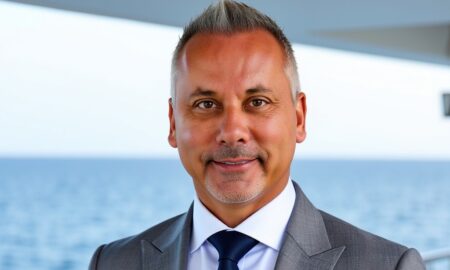
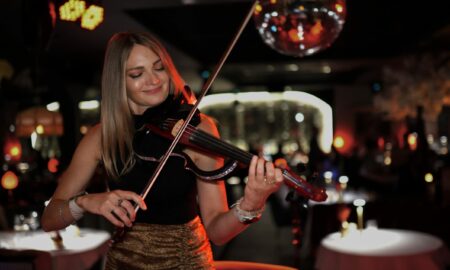

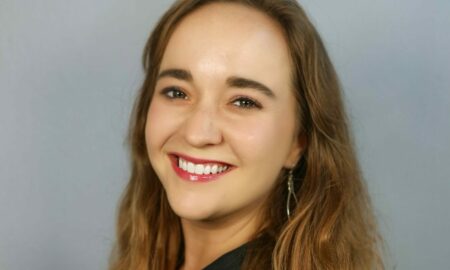
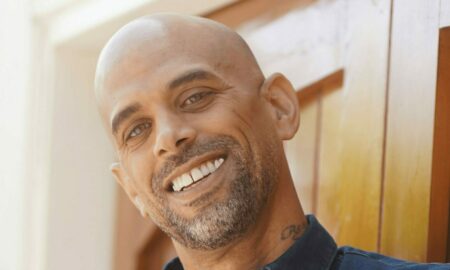
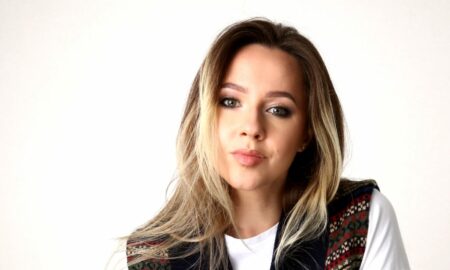
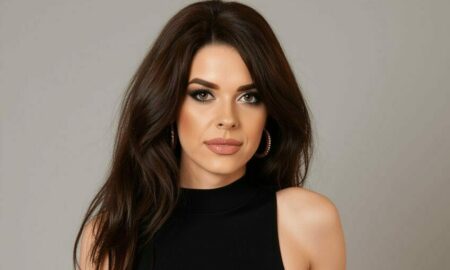
Mo
August 7, 2019 at 11:43
Wow, what a great story! I love Koi’s Music and hope she will find big success.